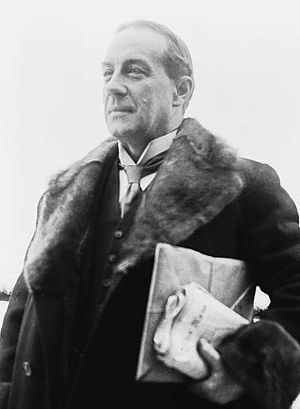Stanley Baldwin
Stanley Baldwin (3 August 1867 in Bewdley, Worcesterhire – 14 December 1947 in Stourport-on-Severn, Worcestershire) was a British politician who was Prime Minister three times.
A member of the Conservative party, he was Chancellor of the Exchequer from October 1922 to May 1923. After Andrew Bonar Law was forced by ill health to resign the premiership, Baldwin succeeded him and held office until January 1924 when, without a House of Commons majority, his government resigned and was replaced by the first-ever Labour administration under James Ramsay MacDonald. This government had no majority either and Ramsay MacDonald had to call a general election the following October.
The Conservatives won and Baldwin was restored to office. He appointed Winston Churchill as his Chancellor. Despite the 1926 General Strike and Churchill's ill-advised restoration of the gold standard, Baldwin achieved some needed reforms especially the enfranchisement of women aged 21 and over. In foreign policy, the main achievement was the Locarno non-aggression pact. At home, there was an expansion of state pension, a drive to increase house building, and some local government reform.
The Conservatives lost the May 1929 election to Labour. Baldwin retained the party leadership despite heavy criticism. In 1931, when Ramsay MacDonald decided to form a coalition to face the Great Depression, Baldwin was appointed Lord President of the Council. He became Prime Minister again in 1935 and won a landslide victory in the election that year. In 1936, he had to handle the abdication crisis and, recognising public feeling about Edward VIII's affair with the twice-divorced Wallis Simpson, he told the King that he must end the affair or relinquish the throne. Baldwin had tried to promote international disarmament but he failed to understand the threat posed by Hitler to world peace. He belatedly introduced new defence policies but, after the Second World War began, he was criticised for having done too little too late.
He chose to retire from politics in May 1937 and was created Earl Baldwin of Bewdley.
